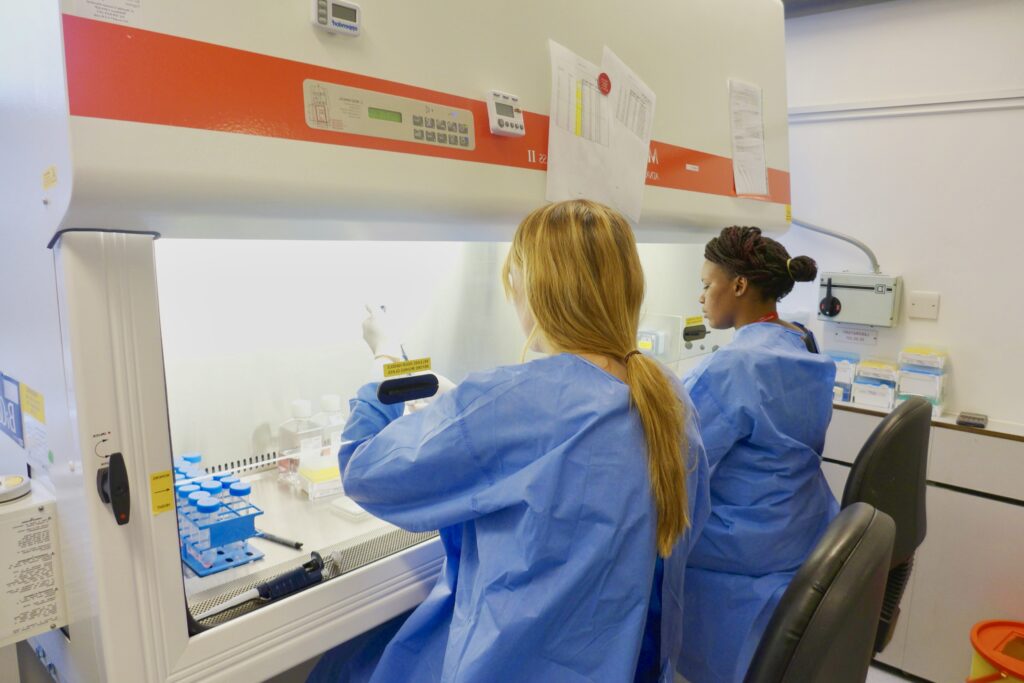May 7, 2024
IAVI’s Human Immunology Laboratory relocates samples to Africa, fulfilling capacity strengthening goal
Lab to close June 30, 2024.
IAVI is proud to announce that after more than 20 years of strengthening scientific capacity in partner African and Indian laboratories to enable sustainable independent research and diagnostics activities in those regions, it has relocated key assets from the biorepository of samples stored at the IAVI U.K.-based Human Immunology Laboratory (HIL) to the Aurum Institute in Johannesburg, South Africa.

The samples were generated from African epidemiological and HIV vaccine clinical trials supported by the U.S. Agency for International Development (USAID) and other funders. For the past 20 years, these study specimens, many from ground-breaking large longitudinal studies, have been an invaluable source of research material shared with the larger research and development community, yielding important scientific insights and valuable clues about HIV disease progression while driving the next wave of immunogen design.
Most notably, these samples led to the landmark discoveries of new HIV broadly neutralizing antibodies (bnAbs) in 2009, garnering worldwide attention in the scientific and general media. The discovery of potent bnAbs marked an important milestone in the field and changed our understanding of what might be possible for the development of an HIV vaccine — sparking a new era of HIV vaccine development that IAVI and partners are pursuing, with promising early results.
IAVI HIL’s lease on space at Chelsea & Westminster Hospital ends on June 30, 2024. Following the successful, planned relocation of the biorepository of designated samples to Africa, IAVI is closing HIL operations. Biological samples not relocated to Aurum that remain scientifically relevant and biologically viable have been moved to U.S. and U.K. locations of a commercial biorepository.
For over two decades, the HIL played a central role in strengthening African and Indian scientific laboratories. This work led to the establishment of fully accredited Good Clinical Laboratory Practice (GCLP) laboratories across Africa, ensuring the standardization of laboratory procedures used in clinical trials. HIL-enabled progress included technology transfer of multiple innovative and critical research laboratory tools to Africa and India in support of the conduct of innovative clinical trials as well as important basic and translational HIV research. The capabilities and accomplishments of the HIL’s global laboratory partners are testament to the fulfillment of a central founding goal of the HIL.
A small IAVI U.K.-based team, formerly housed at the HIL, will focus on ongoing assay work for IAVI’s emerging infectious diseases (EIDs) vaccine trials and perform technology transfers to African labs that will be conducting assays for the trials.
At the same time, another U.K.-based IAVI team is developing a strategy for a new research program on antimicrobial resistance (AMR), an area with critically high unmet needs and sweeping implications for global health. Our intention is to work in collaboration with partners globally to implement this AMR strategy.
At IAVI’s three discovery labs (Brooklyn and La Jolla, U.S., and Faridabad, India) IAVI and partner scientists’ efforts remain focused on identifying and designing new vaccine and antibody candidates to address HIV, tuberculosis (TB), and EIDs.
On behalf of the IAVI Board of Directors and our Leadership Team, we thank our current and former HIL colleagues for their service and for their many contributions to HIV, TB, and EID vaccine research and to supporting robust R&D systems in African countries and India. We also thank USAID and the U.S. President’s Emergency Plan for AIDS Relief (PEPFAR), the Coalition for Epidemic Preparedness Innovations (CEPI), the EU Horizon2020 program and the European & Developing Countries Clinical Trials Partnership (EDCTP), Imperial College London, and our other funders and partners for their support of work at the HIL.